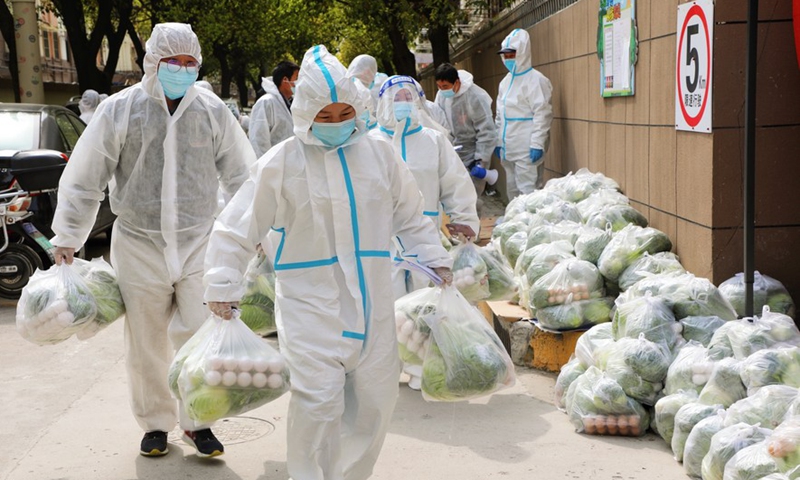
Volunteers carry daily necessities for residents in Fengxian District, east China's Shanghai, March 28, 2022. (Photo: Xinhua)
The delivery capacity levels of some key e-commerce platforms in Shanghai recovered to about 80-90 percent of the pre-epidemic level on Tuesday, as local authorities set up a "whitelist" for key firms and riders to resume work and deliver essential supplies to residents amid strict anti-epidemic management.
The financial hub has established a "whitelist" for key e-commerce platforms, delivery companies and delivery riders in an effort to secure the supply of essential goods within the city, local officials said during a daily press conference on Tuesday.
In another sign that logistics in the financial hub are recovering, the Asia No.1 Warehouse of JD.com in the Jiading district restarted under closed-loop management. The warehouse was shut down due to the severe outbreak of the COVID-19 in the city.
The Asia No.1 facility is one of the largest e-commerce logistics warehouses in China, and a main logistics hub for JD.com in the Yangtze River Delta, a major economic powerhouse in China.
Meanwhile, Chinese retailer Suning.com said in a statement it sent to the Global Times on Tuesday that the delivery rate of large items has returned to 90 percent of the level before the latest outbreak, and that of small items to 80 percent. About one-third of the local workers are on duty, the company said.
The firm said another two groups of workers from more than 10 provinces and cities across China arrived in Shanghai on Friday and Tuesday, relieving much of the local delivery pressure.
Dada group, a Shanghai-based online retail and delivery platform, told the Global Times on Tuesday that its delivery capacity has jumped in recent days. "We're on the whitelist of e-commerce platforms, and we've already sent a list of our deliverymen to the local government," it said.
On Tuesday, officials disclosed that the current number of on-duty delivery riders in the city has reached 20,000. The total order volume across major delivery platforms hit 2.2 million on Monday, increasing by over 1 million orders in only 10 days.
The municipal government asked different districts in Shanghai to set up special channels for free and priority nucleic acid testing to ensure riders are available for work.
The move is one of the most recent efforts by the megacity, which is home to 25 million residents, many multinationals and high-end manufacturers, to encourage work resumption across key supply chains while striving to contain the Omicron resurgence.
Shanghai authorities on Saturday issued epidemic prevention guidelines for local industrial enterprises to resume operations, and food manufacturers critical to residents' livelihoods were among the priority sectors allowed to resume operation.
In order to help food production enterprises resume normal production and ensure market supply, the local market regulator has adopted a "one enterprise, one method" approach, and set up a whitelist for food companies, to help them resume production and address any difficulties.
As of Monday, 1,371 production enterprises had been inspected and guided for the resumption of work, and 280 food production enterprises had resumed production, the regulator said on Tuesday.
Carrefour Shanghai, which is on the whitelist, said that about 80-90 percent of its physical stores will resume operation by April 23, though some of its stores are still waiting for local authorities' environmental assessments.
With more employees who were originally unable to return to their positions getting back to work, and the arrival of reinforcements from Central China's Wuhan and other places, they will be added to the sorting, distribution and other posts of stores, Carrefour said in a note it sent to the Global Times on Tuesday.


